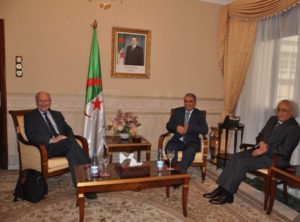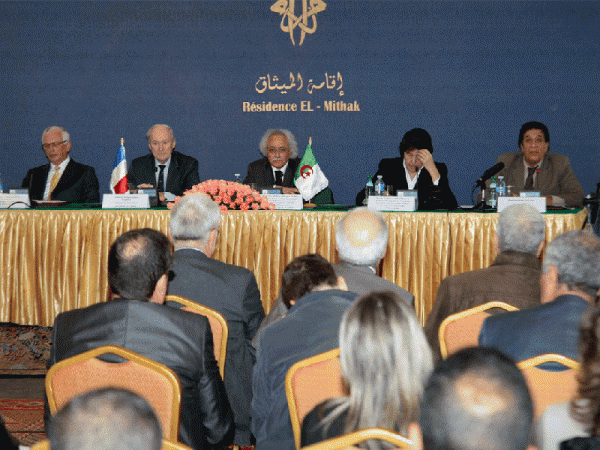Opinion | Prospects for an Algerian academy of science and technology by 2014
There is no doubt that science is a crucial driver of social and economic development. Scientists therefore have a duty to both inform the general public about how findings from science can benefit day to day activities, and to direct the best of their efforts towards addressing national and international problems. Science academies can play an important role in empowering scientists to help them realise this duty because they provide a framework through which scientists can corroborate and channel their efforts. They act as collective hubs to organise scientific endeavour as well as motivate, support and reward excellence in scientific research.
Additionally, science academies can act as think-tanks that bring together multidisciplinary expertise to advise policy makers on how to address present challenges facing their nations, and to help envision strategies for driving future development including, crucially, critiquing science policies. Indeed, many science academies across the world have been moving towards this advisory direction to ensure expert findings can feed directly into local and regional legislative and executive bodies.
With this in mind, Algeria is, and has been for a while now, in dire need of such an organising expert body.
Last April, Algeria Press Services (APS) announced official plans for establishing an Algerian academy of science and technology before the end of the first trimester of 2014. The project is to be developed with contributions from the National Economic and Social Council (CNES), led by its president Mohamed Seghir Babes, in “close collaboration”, we are told, with representatives from the french academy of science.
 The APS announcement and the subsequent media reports that picked up on it were very thin on details however, leaving open a number of questions about this ambitious project.
The APS announcement and the subsequent media reports that picked up on it were very thin on details however, leaving open a number of questions about this ambitious project.
The first of these is timing. It is worth noting that this is not the first time a project to create an Algerian academy of science has been pursued. The now inactive IBScientific Publishing Group called for the creation of such an academy as far back as 2006 and put the subject on the discussion table again during a conference held in Algiers in April 2007 and that brought together over 100 expatriate scientists and researchers. Though it caught the media’s attention at the time, the project to develop an independent academy of science that stemmed from the community of Algerian scientists and researchers themselves never saw light.
In an interview with the official television channel, Babes emphasised that the current government-initiated project to develop an academy of science is to be completed in “the soonest possible time”, which gives an uneasy and conflicting sense of urgency to the project. We know from another interview with Babes that the project has been in the making for the past two years – though without any mention of it in the media nor within academic circles. Scientists and academics, who should be fully involved in putting together the structure as well as the set of priorities and working road map for the academy, seem to have only been engaged at the final stages of this urgently needed project.
The “close collaboration” with the french academy of science also raises concern as to whether what we are witnessing is yet another facet of a continuing politics of dependency, or whether a close collaboration with a well established academy of science is actually justified.
These and many other unanswered questions become more significant if one considers a couple of other issues that should be fundamental to the establishing of an academy of science: priorities and autonomy. Where does the future academy and its activities fit within national development priorities? And what level of autonomy will it have?
Priorities
In another official channel interview, the president of the french academy singled out the field of energy as a major area where the future academy is to make significant contributions. Energy is of course an area of utmost importance for Algeria. But when put in the context of the ongoing partnership agreement between the two countries and the historical interest France has in the Algerian desert and its resources, it seems that this “close collaboration” could ultimately lead to influencing the direction of the future academy’s focus to one set of priorities at the expense of other perhaps more pressing national and local needs. Will the academy become a tool to provide scientific justifications for government choices and policies in the energy sector?
The issue of energy is quite a contentious one for Algeria, whose reliance on fossil fuel as a main source of income continues to weaken its national sovereignty. If anything, the future academy of science should make it a priority to advise as well as demonstrate to the government how other types of science can effectively promote more diverse sources of national income and drive healthier economic growth.
A sensible approach for Algeria is therefore to diversify its collaborations to include countries who share similar concerns and challenges and who have already established national academies of sciences. Obvious instances for potential collaborations include the Pan-African Academy of Sciences and The World Academy of Sciences (TWAS, formerly The Academy of Science for the Developing World), which bring together a consortium of science academies from across the developing countries. There is certainly a lot that Algeria can learn from TWAS and its members who recently established academies of science to find out how they are effectively contributing to development. For example, while there might be obvious differences across countries, science academies in the developing world tend to share a common concern about the relationship between science education and development and hence include science education and outreach amongst their top priority areas.
Amidst the current challenges facing Algerian science and university-based education and research in particular, establishing a healthy research ecosystem should also be amongst the top priorities of the future academy of science. The academy should actively seek to ensure that the government makes two major and serious long term commitments. First, to supporting science and to establishing appropriate regulations and support mechanisms for research-based innovation that can convert findings from science into actual economical growth. Second, to educational reforms that place scientific inquiry and problem solving at its core. After all, how else are we to ensure that people have the appropriate skills to take up jobs created by science if not through a robust educational system that adequately incorporates STEM subjects (Science, Technology, Engineering and Maths) in curriculums.
Autonomy
The question of support plans and their relation to development priorities brings about the fundamental issue of autonomy. This is a particularly crucial issue to consider if the academy is to take an effective advisory role and engage in both research activities and policy.
In his interview, Babes declared that “the creation of the academy forms part of the state strategy to build a national economy based on knowledge and a knowledge society”. Clearly then, the aim here is to develop an academy of science that can produce adequate advice to policy makers. But it is hard to imagine how an academy of science can establish a truly independent critical and evidence-based science dialogue with a government whose policies directly influence its activities.
The issue of autonomy is not as trivial as one would think, however. An academy of science whose role includes advising policy should be independent from the government it provides advice for, yet in the case of Algeria, the answer is not this straightforward. This is because one has to consider the ability of the academy to achieve its core functions of supporting and promoting excellence in science in the first place before it can be a proper advisory body.
A closer look at the inner structures of science academies should clarify this point. Science academies are typically of two types, they can either be a collection of outstanding scholars and academics or a collection of institutions and research centres. The current Algerian research ecosystem includes hardly any non-governmental support for research – e.g. industry research, philanthropy, etc. – and so a reliance on government support – and its existing research institutions – to implement a project of this scale seems inevitable if it is to be developed at this point in time.
A first challenge for the future academy, if it is to provide objective and balanced policy advice, is therefore to ensure adequate legislation is put in place at the onset of its creation to ensure adequate levels of autonomy are preserved.
This is not completely far fetched. Take the example of the Turkish academy of science for instance. In 2011, the Turkish government announced that it will have direct involvement in the academy’s affairs, including members recruitment. The government was rightly criticised for this move and members of the Turkish academy threatened to collectively resign and establish a new independent academy in protest. The Turkish academy, although funded by the government, now operates independently by government decree. Similarly, science academies of all of Georgia, Latvia and Estonia also operate independently by government decree. Thus, without appropriate measures to guarantee the independence of the future academy, Algeria will likely end with a superficial institution incapable of bring about real impact on scientific excellence and academic research and the development of the country as a whole.
The biggest hurdle to practically achieve any of the above remains to be the need for robust rule of a law in the country, and a genuine political will that would encourage such an independent body to exist and flourish in Algeria. For now, the wider community of Algerian academics, scientists and researchers should come together in unity to ensure an appropriate foundation of an academy that should ultimately be theirs. The risk they otherwise run is ending up with an academy of science that functions under governmental control, which will not only undermine its advisory role but also its ability to act as a hub for championing intellectual freedom and ultimately its role as a driver of genuine scientific creativity and excellence in research and education.
3 Comments so far
Opinion | Pfizer’s pursuit of AstraZeneca: the Algerian scientific community should take note | Inspire MagazinePosted on 5:14 pm - May 30, 2014
[…] first step in this is to have an independent Algerian Academy of Science that acts as an umbrella that brings together all Algerian scientists, engineers, artists…etc. […]
wafaPosted on 2:57 pm - Jan 31, 2016
Hi,
I have read two of your papers, I cannot see references or quotes from publishers to be an evidence to this kind of personal writing.
Thank you,
wafa

About the Author